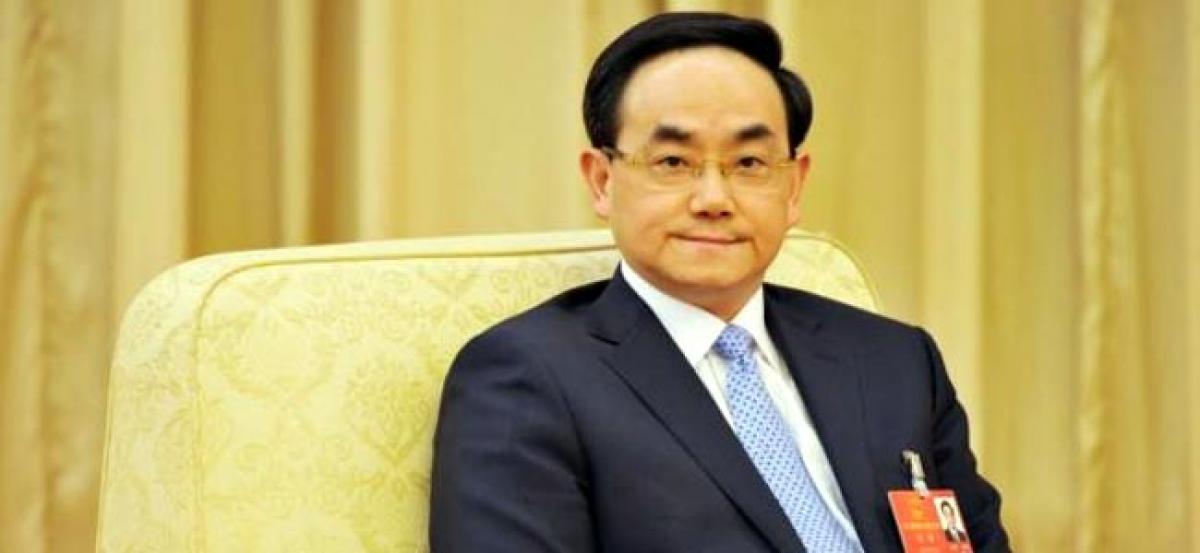Live
- Six Useful Strategies to Control Your Heart During the Pollution Season
- Phalodi Satta Bazar Predicts Close Race in Maharashtra Assembly Election 2024
- Federer Pays Heartfelt Tribute to Nadal Ahead of His Retirement: "An Epic Career"
- Odisha holds successful mega investors roadshow in Singapore
- PGTI Tour: Top stars to fight for honours in Servo Masters Golf
- SC upholds termination of LIC employee for absenting himself without intimation
- ‘Stone me or shoot me, won’t spare anyone,’ says Anil Deshmukh after discharge
- Siddaramaiah, Shivakumar turning Karnataka into Pakistan: K’taka BJP
- Zimbabwe records 70 suspected cholera cases, one death amid new outbreak
- Babri demolition day: No Assembly proceedings in Bengal on Dec 6
Just In

China on Wednesday appointed a new head of its powerful internet regulator, a man who has publicly vowed to maintain the ruling Communist Party\'s tight grip over cyberspace.
China on Wednesday appointed a new head of its powerful internet regulator, a man who has publicly vowed to maintain the ruling Communist Party's tight grip over cyberspace.
The Chinese government exercises widespread controls over the Internet and has sought to codify that policy in law. Officials say such restrictions are needed to ensure security in the face of rising threats, such as terrorism.
In a brief report, the official Xinhua news agency said Lu Wei will no longer head the Cyberspace Administration of China, naming one of his deputies, Xu Lin, as his replacement.
Xu, 53, was in charge of propaganda in China's commercial capital Shanghai from 2013-15 before being moved to Beijing to become a deputy to Lu, according to his biography.
Hong Kong's South China Morning Post said Xu is regarded as a protege of President Xi Jinping. The two men worked together when Xi was briefly Shanghai's Communist Party chief in 2007.
In an article about internet management for influential bimonthly party journal Qiushi in October, Xu pledged to uphold party leadership over the Internet and management of the media and public opinion "without any equivocation".
"There can be no turning deaf ears to or ignoring wrong points of view on the internet, fantastic stories and theories, distortions of facts to create rumors or malicious attacks," he wrote.
"I definitely don't see this as a bullish thing for foreign internet companies," said Duncan Clark, chairman and managing director at BDA China, a Beijing-based investment consultancy.
Xinhua did not say where Lu would go next. In China, it can often take weeks before subsequent public appointments are announced. Xinhua also made no mention of Lu's other title - head of the general office of the Central Leading Group for Internet Security, another body that oversees internet policy.
Reuters was unable to reach either Lu or Xu for comment.
"NOT WELCOME"
Lu worked his way up though Xinhua before becoming head of propaganda in Beijing and then moving on to internet work in 2013.
Known for his strong defense of government controls over the Internet, in December he rejected criticism ahead of a major state-sponsored internet conference that China's internet was too censored, saying order was a means to online freedom.
Lu defended blocking some websites and censoring online posts, saying that if the government were being too restrictive, China's online market would not be developing so rapidly.
"Indeed, we do not welcome those that make money off China, occupy China's market, even as they slander China's people. These kinds of websites I definitely will not allow in my house," Lu said.
China has the world's largest population of internet users, at more than 650 million, and is home to some of the biggest internet firms such as Tencent Holdings, Baidu Inc and Alibaba Group Holding.
The government has blocked sites it deems could challenge Communist Party rule or threaten stability, including Western sites such as Facebook and Google's main search engine and Gmail service.

© 2024 Hyderabad Media House Limited/The Hans India. All rights reserved. Powered by hocalwire.com







